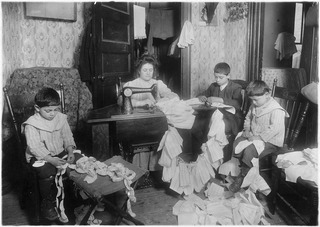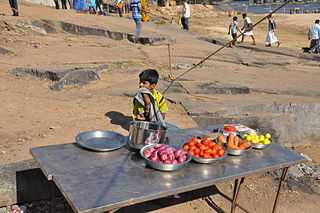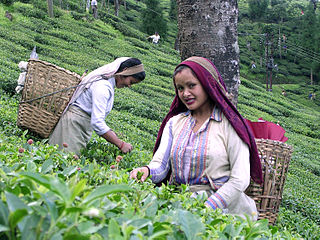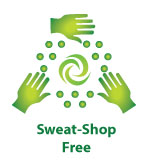Labour laws, labour code or employment laws are those that mediate the relationship between workers, employing entities, trade unions, and the government. Collective labour law relates to the tripartite relationship between employee, employer, and union.

A sweatshop or sweat factory is a crowded workplace with very poor, socially unacceptable or illegal working conditions.The manual workers are poorly paid, work long hours, and experience poor working conditions. Some illegal working conditions include poor ventilation, little to no breaks, inadequate work space, insufficient lighting, or uncomfortably/dangerously high or low temperatures. The work may be difficult, tiresome, dangerous, climatically challenging, or underpaid. Workers in sweatshops may work long hours with unfair wages, regardless of laws mandating overtime pay or a minimum wage; child labor laws may also be violated. Women make up 85 to 90% of sweatshop workers and may be forced by employers to take birth control and routine pregnancy tests to avoid supporting maternity leave or providing health benefits. The Fair Labor Association's "2006 Annual Public Report" inspected factories for FLA compliance in 18 countries including Bangladesh, El Salvador, Colombia, Guatemala, Malaysia, Thailand, Tunisia, Turkey, China, India, Vietnam, Honduras, Indonesia, Brazil, Mexico, and the US. The U.S. Department of Labor's "2015 Findings on the Worst Forms of Child Labor" found that "18 countries did not meet the International Labour Organization's recommendation for an adequate number of inspectors."
No Sweat is a broad-based not-for-profit organisation with HQ in London's Kings Cross, England, which fights for the well-being and protection of sweatshop labourers, not only in developing countries but also in Britain.

Piece work or piecework is any type of employment in which a worker is paid a fixed piece rate for each unit produced or action performed, regardless of time.

The term ethical trade first gained currency in the mid-1990s, where it was used as a term for socially responsible sourcing. Ethical trade addresses the ethical aspects of organisations including worker welfare, agricultural practice, natural resource conservation, and sustainability of the environment. Since then, numerous multinational organisations have adopted ethical trade policies by outsourcing to auditing companies to monitor the conditions of workers in their supply chains. The leading alliance of these companies, trade unions and non-governmental organisations is the Ethical Trading Initiative. to support business

The New York shirtwaist strike of 1909, also known as the Uprising of the 20,000, was a labour strike primarily involving Jewish women working in New York shirtwaist factories. It was the largest strike by female American workers up to that date. Led by Clara Lemlich and the International Ladies' Garment Workers' Union, and supported by the National Women's Trade Union League of America (NWTUL), the strike began in November 1909.

The International Labor Rights Forum (ILRF) is a nonprofit advocacy organization headquartered in Washington, D.C., U.S., that describes itself as "an advocate for and with the working poor around the world." ILRF, formerly the "International Labor Rights Education & Research Fund", was founded in 1986, and the organization's mission statement reads: "ILRF believes that all workers have the right to a safe working environment where they are treated with dignity and respect, and where they can organize freely to defend and promote their rights and interests. ILRF works to develop practical and effective tools to assist workers in winning enforcement of protections for their basic rights, and hold labor rights violators accountable."

The Fair Labor Association (FLA) is a non-profit collaborative effort of universities, civil society organizations, and businesses.
The Clean Clothes Campaign (CCC) is the garment industry's largest alliance of labour unions and non-governmental organizations. The civil society campaign focuses on the improvement of working conditions in the garment and sportswear industries. Formed in the Netherlands in 1989, the CCC has campaigns in 15 European countries: Austria, Belgium, Denmark, Finland, France, Germany, Italy, Ireland, Netherlands, Norway, Poland, Spain, Sweden, Switzerland and the United Kingdom. The CCC works with a partner network of more than 250 organizations around the world.
China Labor Watch (CLW) is a New York City, New York-based non-government organization founded by labor activist Li Qiang in October 2000. Its mission is the defense of workers' rights in China. Through research, advocacy and legal assistance, CLW seeks to help China's workers become more informed of their rights and more empowered to realize those rights within their communities.
Anti-sweatshop movement refers to campaigns to improve the conditions of workers in sweatshops, i.e. manufacturing places characterized by low wages, poor working conditions and often child labor. It started in the 19th century in industrialized countries such as the United States, Australia, New Zealand and the United Kingdom to improve the conditions of workers in those countries.
Dan McDougall is an international journalist. He is the current Africa Correspondent for The Sunday Times of London. He has reported from over 126 countries and war zones including Afghanistan, Somalia, Pakistani Kashmir, Northern Yemen, The Sudan, The Eastern Democratic Republic of Congo, Burma, Rwanda, Bosnia, China, Hezbollah-controlled Lebanon and the Palestinian Territories.
Apple Inc. manufactures most of its products in China through partners like Foxconn. Apple's decision to outsource its manufacturing has received significant criticism, due to allegations of poor working conditions, long work hours, and other labor rights violations. In response, Apple launched its Supplier Responsibility program, which aimed to improve Apple's oversight of supplier partners and enforce its ethics policies. It has also attempted to introduce greater diversification into its supply chain by sourcing products from other countries.
Nike, Inc. has been accused of using sweatshops and worker abuse to produce footwear and apparel in East Asia.

Fair Wear Foundation (Fair Wear) is an independent multi-stakeholder organisation that works with garment brands, garment workers and industry influencers to improve labour conditions in garment factories. Receiving the Fair Wear stamp of approval does not guarantee any existing quality of labour standards, instead only demonstrating a stated interest in working toward improvement.
Alta Gracia Apparel is a living wage apparel company manufacturing that sells licensed collegiate and professional sports apparel to university bookstores and online retailers. Their factory, located in Villa Altagracia, Dominican Republic is the first and only verified Living Wage company of its kind.
Clothing industry or garment industry summarizes the types of trade and industry along the production and value chain of clothing and garments, starting with the textile industry, embellishment using embroidery, via the fashion industry to apparel retailers up to trade with second-hand clothes and textile recycling. The producing sectors build upon a wealth of clothing technology some of which, like the loom, the cotton gin, and the sewing machine heralded industrialization not only of the previous textile manufacturing practices. Clothing industries are also known as allied industries, fashion industries, garment industries, or soft goods industries.

Export-oriented employment refers to employment in multinational corporations' international industrial factories, usually located in developing countries. Such factories produce goods and services for sale in other countries. While these multinational producers have globally expanded women's access to employment, evidence suggests they do so by reinforcing traditional gender roles or creating new gender inequalities. Such gender inequities allow multinational firms to greater exploit profits per worker than they would otherwise due to the decreased labor cost. This decrease in the cost of labor comes as a result of the relegation of women to certain occupations. Studies show that in the quest for lower unit labor costs, export-oriented facilities create poor working conditions.
The Ethical Trading Initiative (ETI) is a UK-based independent body founded on 9 June 1998, which brings together companies, trade unions and non-governmental organisations (NGOs) to ensure compliance with international labour standards in the global supply chains of member companies. Minimum ethical standards are set out in the ETI Base Code.
The National Garment Workers Federation (NGWF) is a registered national trade union federation of garment workers in Bangladesh. With 87 registered factory unions, it ifs considered one of the four main federations of garment workers' unions. NGWF is the initiator and a member of the Bangladesh Garments Workers Unity Council and a member of the Bangladesh Center for Workers' Solidarity. It is affiliated with the IndustriALL Global Union and one of the signatories of the Bangladesh Accord.












